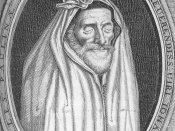Meditation 17
In "Meditation 17" by John Donne, Donne uses many different methods of trying to get his message out. By using metaphors, images, and paradoxes Donne gets his message out but in a perplexing way. In order to understand what Donne is saying, this passage must read over and analyzed sentence by sentence to really see the true meaning of the excerpt.
Donne uses a book as a metaphor, with man as a chapter for every part of the book and God is the author. Donne believes God controls everything and everything happens for a reason. Donne then states, "God employs several translators; some pieces are translated by age, some by sickness, some by war, some by justice; but God's hand is in every translation." The translations of age, sickness, war, and justice are all things that can cause death. In that case, these elements can translate human beings into spirits of heaven or to anywhere else God chooses to send them.
One of the most popular metaphors Donne uses is "No man is an island, entire of itself; every man is a piece of the continent, a part of the main. If a clod be washed away by the sea, Europe is the less, as well as if a promontory were any mans death diminishes me, because I am involved in mankind; and therefore never send to know for whom the bell tolls; it tolls for thee." Here Donne is trying to say that one person cannot stand-alone. Human beings need each other for survival and support. Donne then starts to talk about the death bell. He says whenever the bell tolls it is tolling for more than the one person who has died but it also is tolling for those who have been left...



"Meditation 17"
Pretty good essay on "Meditation 17." Didn't find much wrong aside from just a couple grammar errors.
3 out of 3 people found this comment useful.